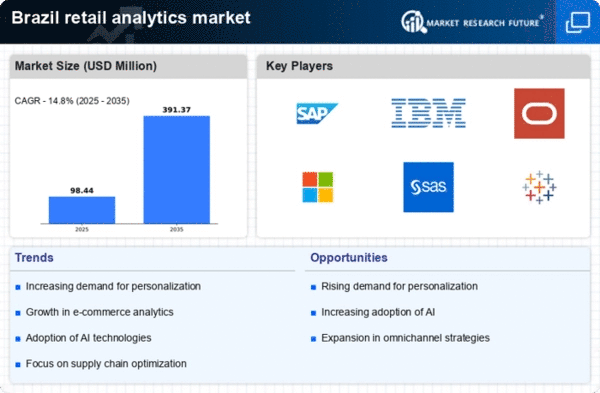Rising E-commerce Penetration
The retail analytics market in Brazil is significantly impacted by the rising penetration of e-commerce. With online shopping becoming increasingly popular, retailers are compelled to adopt analytics solutions to understand online consumer behavior. Recent statistics indicate that e-commerce sales in Brazil have grown by over 30% in the past year, highlighting the need for effective analytics. Retailers utilize these analytics to optimize their online presence, enhance user experience, and tailor marketing efforts. The insights gained from e-commerce analytics allow businesses to identify trends and preferences, ultimately driving sales and improving customer retention. This shift towards e-commerce necessitates a robust retail analytics market to support data-driven decision-making.
Focus on Personalization Strategies
The emphasis on personalization strategies is a key driver for the retail analytics market in Brazil. Retailers are increasingly utilizing analytics to create personalized shopping experiences for consumers. By analyzing customer data, businesses can tailor product recommendations and marketing messages to individual preferences. This approach has been shown to increase customer engagement and loyalty, with studies indicating that personalized marketing can boost sales by up to 25%. As Brazilian consumers become more discerning, the demand for personalized experiences grows, prompting retailers to invest in analytics solutions. The retail analytics market thus plays a crucial role in enabling retailers to implement effective personalization strategies that resonate with their target audience.
Integration of Advanced Technologies
The integration of advanced technologies significantly influences the retail analytics market in Brazil. Retailers are increasingly adopting technologies such as machine learning and big data analytics to enhance their operational capabilities. This integration is projected to contribute to a market growth of around 20% over the next five years. By utilizing these technologies, retailers can gain deeper insights into customer preferences and purchasing patterns. Furthermore, the ability to process real-time data enables businesses to respond swiftly to market changes, thereby improving customer satisfaction. As the retail landscape continues to evolve, the reliance on advanced analytics tools becomes more pronounced, positioning the retail analytics market as a critical component of retail strategy.
Growing Demand for Data-Driven Insights
The retail analytics market in Brazil experiences a notable surge in demand for data-driven insights. Retailers increasingly recognize the value of leveraging analytics to understand consumer behavior and preferences. This trend is evidenced by a reported growth rate of approximately 15% in the adoption of analytics tools among Brazilian retailers. As businesses strive to enhance operational efficiency and optimize inventory management, the retail analytics market becomes essential. Retailers utilize these insights to tailor marketing strategies, improve customer engagement, and ultimately drive sales. The ability to analyze vast amounts of data allows retailers to make informed decisions, thereby enhancing their competitive edge in a rapidly evolving market.
Regulatory Compliance and Data Security
Regulatory compliance and data security are becoming increasingly important in the retail analytics market in Brazil. As data privacy regulations evolve, retailers must ensure that their analytics practices comply with legal standards. This necessity drives the demand for robust analytics solutions that prioritize data security. Retailers are investing in technologies that not only provide insights but also safeguard customer information. The market is expected to grow by approximately 10% as businesses seek to balance analytics capabilities with compliance requirements. Ensuring data security while leveraging analytics is crucial for maintaining consumer trust and loyalty, making the retail analytics market a vital component of retail operations.
















